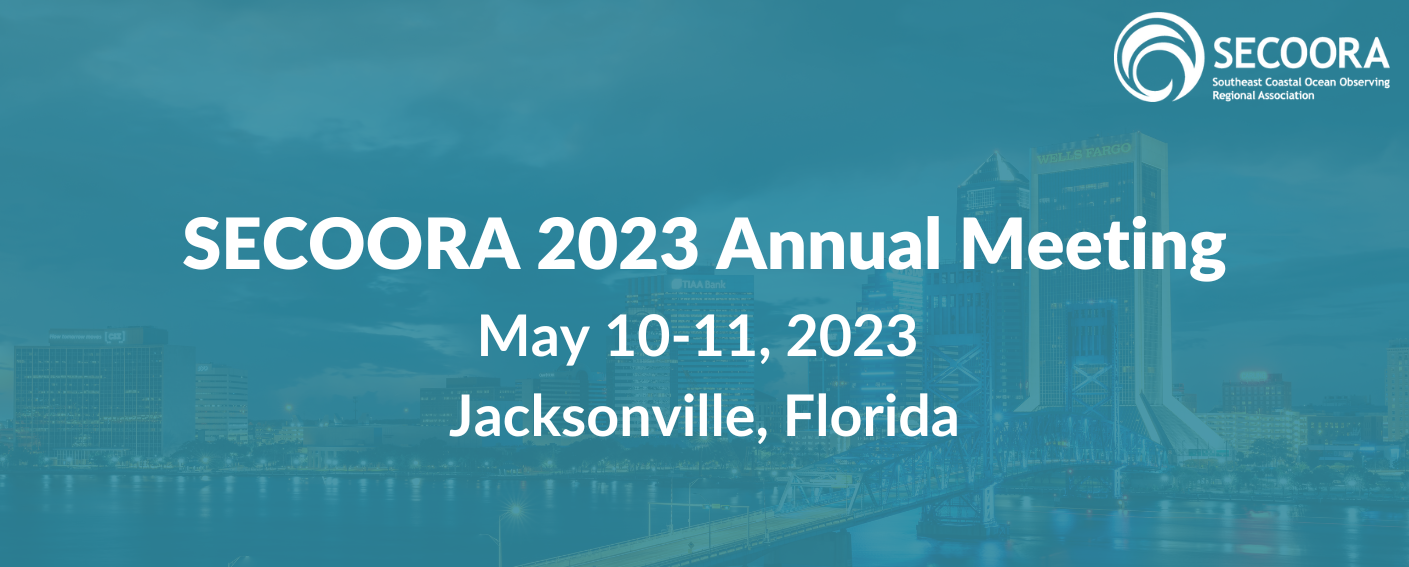Our 2023 Annual Meeting was hosted in Jacksonville, FL on May 10-11, 2023 by Jacksonville University. The meeting brought together coastal ocean scientists from around the Southeast to learn about SECOORA coastal observing activities and particpate in discussions on hot topics such as resilience, right whale monitoring, and offshore wind energy.
Thank you to Sequoia Scientific, Inc. for being our Gold Sponsor and to the Marine Science Research Institute at Jacksonville University for hosting us. A summary and meeting materials (including presentations) are posted below.
Delivering Data for Decisions

At the meeting, we unveiled the new SECOORA logo and previewed our new website (coming summer 2023). This branding effort is helping us communicate our purpose more clearly and position us for the future as we grow to meet the needs of coastal communities and a thriving blue economy.
The new logo pays homage to our beloved old logo while incorporating vibrant sand-to-sea colors. The new colors symbolize our commitment to delivering observational data from the coast to the ocean.
Accompanied by our fresh tagline, ‘Delivering Data for Decisions,’ our branding and clear messaging efforts ensure we are effectively conveying our commitment to friendly, trusted, and collaborative relationships, while highlighting our dedication to delivering high-quality data for informed decision-making. Below are our core values and a preview of our updated messages.
Scientific
integrity
We are dedicated to maintaining the highest standards of data collection and processing. We are a certified Regional Coastal Observing System and our data is held to NOAA’s robust standards.
Available, accessible, and free
We ensure observing data that is vital to safeguarding coastal ocean ecosystems and communities is available, accessible, and free for everyone.
No one does
it alone
We facilitate interdisciplinary collaborations and knowledge sharing to advance science, technology, and drive inclusive, science-driven solutions.
Community driven innovation
We utilize emerging technologies to provide the data and information that coastal communities need to thrive in a changing world and build a flourishing blue economy.
Active coastal ocean stewardship
By sharing our data freely and facilitating communications and collaborations we support science-based decisions for improved management of our shared coastal ocean.
Day 1
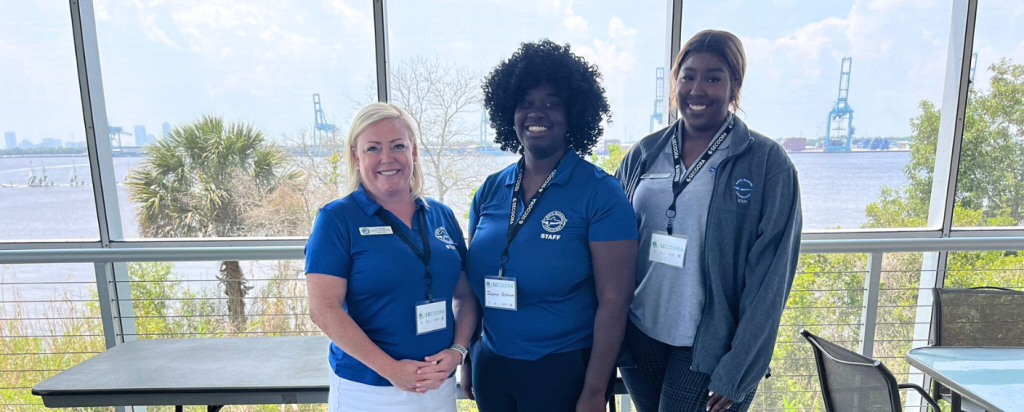
The meeting kicked off with a Mentor Development Workshop hosted by Jasmin Graham, Aly Busse, and Keiondra Marshall from Mote Marine Laboratory. The three hour interactive session overviewed effective methods and strategies to help mentors develop productive and culturally-responsive mentoring relationships with their mentees.
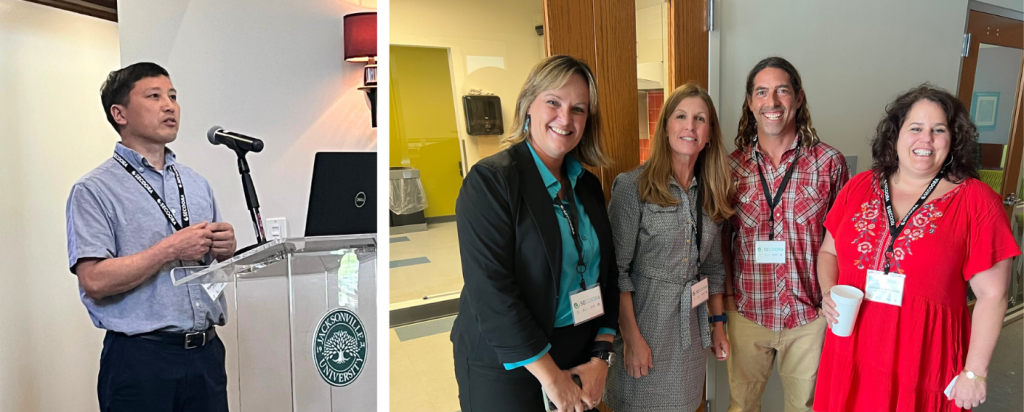
Over 20 SECOORA funded scientists gave lightning talks during the social where they provided an overview of their project, accomplishments, challenges, and future goals. Abstracts were provided for all SECOORA supported projects (click here for abstracts).
A few highlights include an update from Dr. Yongang Liu (University of South Florida (USF)) stating during Hurricane Ian, the USF lab successfully predicted water would be pushed out of the Tampa Bay region three days in advance using their automated West Florida Coastal Ocean Model and Tampa Bay Coastal Ocean Model nowcast/forecast systems. Dr. Jordon Beckler (Florida Atlantic University) announced that new buoys will be deployed off the east coast of Florida in 2024. The buoys will be located off the coasts of Ponce de Leon and Fort Pierce inlets.
Day 2

Thank you to Conrad Lautenbacher (GeoOptics) and Jim Murley (Miami-Dade County) for their service on the SECOORA Board these past six years! A warm welcome to our new Board Members Dr. Erin Hague (TetraTech) and welcome to returning Board Member Dr. Gary Mitchum (University of South Florida).
Join us in welcoming Megan Shaw, Business and Events Manager, and Emily Noakes, Communications Intern, to the SECOORA team.
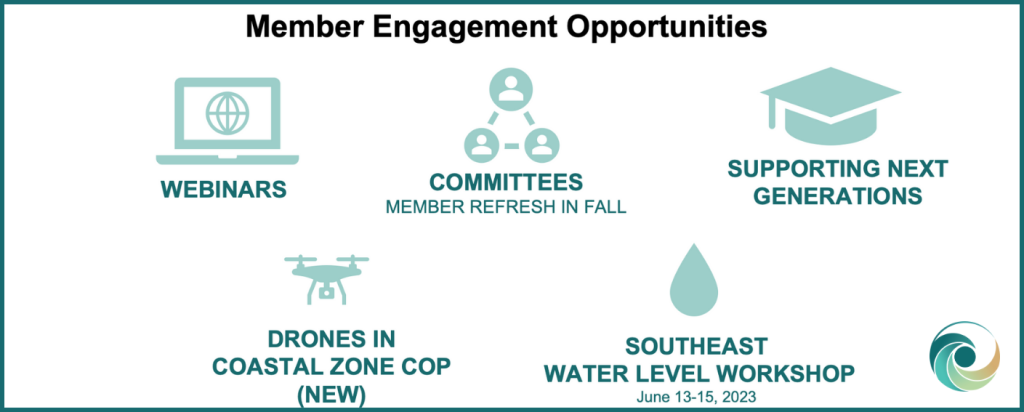
Welcome to newly designated member representative, Scott Harris from College of Charleston. Click here to learn more about membership. SECOORA members influence and guide all our endeavors and help make us a trusted source for coastal ocean information in the Southeast. There are many upcoming events to engage with SECOORA.
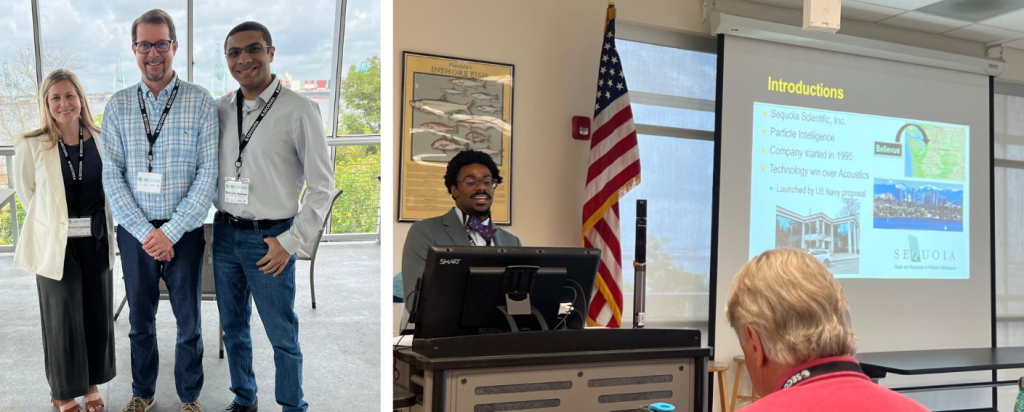
We heard from Carl Gouldman (IOOS), Brandon Barlow (NOAA Knauss Fellow), and Kristen Yarincik (IOOS Association) during the Integrated Ocean Observing System (IOOS) Enterprise updates. Kristen Yarincik is the new director of IOOS Association and her vision is to increase impact to align initiatives with national priorities, promote greater interagency participation, and grow capacity to support collaboration across IOOS regions.
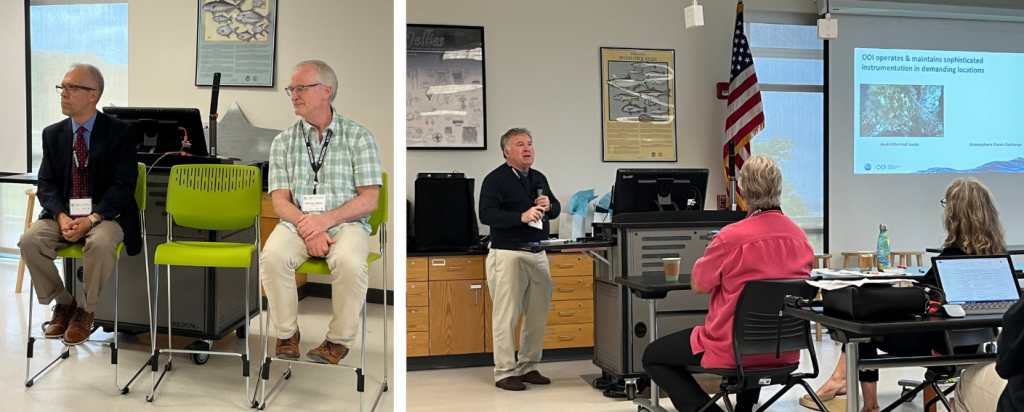
The Hot Topics in the Southeast panel covered three different issues effecting ocean uses in the southeast – Pioneer Array Ocean Observatory Initiative, Offshore Wind Energy, and Monitoring for Right Whales. Highlights from this panel include Dr. Adam Comeau, Ocean Tracking Network, presenting on Coastal Environmental Observation Technology and Research (CEOTR) glider right whale monitoring program in Canada. The monitoring program uses a combination of monitoring technology – glider lines, aerial photography, and more – to identify right whales in shipping lanes. This program ensures right whales are not harmed by port efforts and it helps the industry prevent the negative image of harming whales. Jim Edson, Woods Hole Oceanographic Institution, presented on the Pioneer Array Ocean Observatory Initiative. The array is moving to the coast of North Carolina and has a mission to provide research quality data for a broad user community including scientist, educators, and the general public.
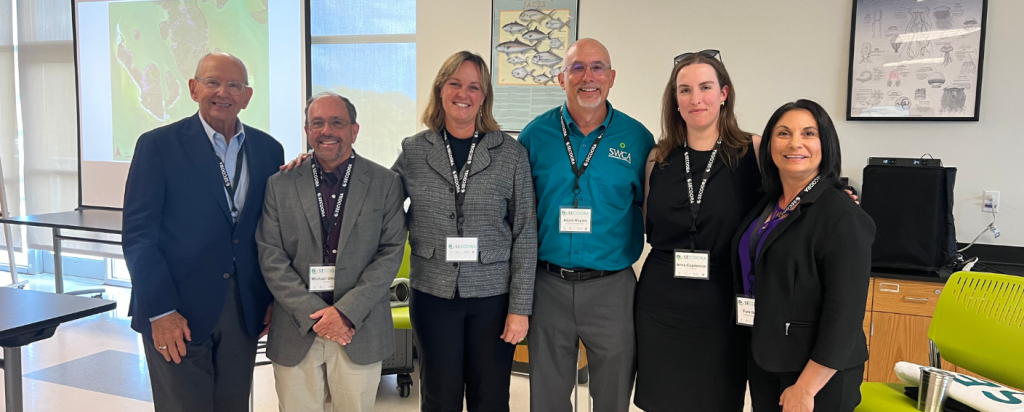
The meeting closed with a Roundup for Resilience fireside chat focusing on effective and inclusive strategies to incorporate 1) people, 2) technology, and 3) data into resilience planning and projects. These strategies better prepare and protect vulnerable communities before, during, and after natural disasters such as storms and flooding.
Anne Coglianese, Chief Resilience Officer, City of Jacksonville, stated “Jacksonville is too large to see every possible issue. Data is being utilized to see the blind spots.”
Thank you for joining us for the SECOORA 2023 Annual Meeting! We can’t wait to see you in 2024. Sign up for our newsletter for updates.
Meeting Materials
- Agenda
- Speaker Bios
- SECOORA Principal Investigator Abstracts
- 2023 Board of Directors Election Procedural Framework
Meeting Presentations
- SECOORA Board and Members Business Meeting – SECOORA Staff
- IOOS Enterprise Updates
- IOOS Association Updates – Kristen Yarincik, IOOS Association
- IOOS Program Office Updates – Carl Gouldman, US IOOS, and Brandon Barlow, Knauss Fellow US IOOS
- Pioneer Ocean Observatory Initiative in the Region
- George Voulgaris, National Science Foundation (email abbey@secooraorgpact.wpengine.com)
- James Edson, Woods Hole Oceanographic Institute (email abbey@secooraorgpact.wpengine.com)
- Offshore Wind Energy
- Monitoring Right Whales
- Extreme Weather and Events
- Hurricane Ian: Coastal Ocean Modeling and Observing – Yonggang Liu, University of South Florida College of Marine Science
- Improving Hurricane Forecasting with Gliders – Gerhard Kuska, Mid-Atlantic Regional Association Coastal Ocean Observing System
- Southeast Water Level Network: Stakeholder Applications – Nicole Elko, American Shore & Beach Preservation Association
- Harmful Algal Blooms (HAB)
- Forecasting Sargassum – Yuyuan Xie, University of South Florida
- SECOORA Harmful Algal Bloom Updates – Jennifer Dorton, SECOORA
- Establishing a Monitoring Program and Identifying Environmental Drivers of HABs in a Model Estuary of Coastal Georgia – Natalie Cohen, University of Georgia Skidaway Institute of Oceanography
- Additional New Projects
- Expanding Southeast Water Level Sensor Network in the Pee Dee Watershed to Reach Underserved Under-resourced Communities – Susan Lovelace, South Carolina Sea Grant Consortium
- St Johns River Modeling – Joe Zambon, North Carolina State University
- NOAA Model Evaluation: New York Harbor – Cook Inlet – Yongang Liu, University of South Florida
- Bipartisan Infrastructure Law
- Ocean Acidification Research in Florida Keys and Southeast Coastal Ocean Acidification Network (SOCAN) – Emily Hall, Mote Marine Laboratory and Program Coordinator for SOCAN
- Southeast & Caribbean Disaster Resilience Partnership (SCDRP) and Surface Elevation Tables – Heather McCarthy, SCDRP and SECOORA
- Drones in the Coastal Zone Community of Practice – Abbey Wakely, SECOORA
- Southeast Marine Mapper – Mary Conley, The Nature Conservancy
- New Buoys off East Coast of Florida – Jordon Beckler, Florida Atlantic University
- Biological
- FACT Network and Updates to DaVIT – Joy Young, The FACT Network
- South Carolina Soundscape Observatory – Eric Montie, University of South Carolina Beaufort
- Augmenting Ocean Observing through Artificial Intelligence: Annotation, Data Standards, and Applications – Luke McEachron, Florida Fish and Wildlife Conservation Commission
- Size Matters: Innovative Length Estimate – Abbey Wakely, SECOORA
- Collaborating with GCOOS for a Marine Biodiversity Observation Network Project – Jennifer Dorton, SECOORA
